Catholic Church prepares for more funerals without priests
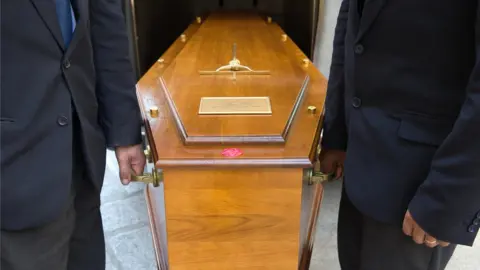 Getty Images
Getty ImagesOn Sunday, a group of 29 men and women will become the first lay funeral ministers to be appointed by the Catholic Church in Northern Ireland.
Traditionally, Catholic funerals are led by clergy rather than lay people - the ceremony includes a Mass which can only be led by an ordained priest.
However, with so few young men joining the priesthood over the past three decades, the Church is struggling to find the manpower to provide the service.
Earlier this year, Bishop of Derry Donal McKeown warned that very soon it might "no longer be the norm" for every individual to have a Mass as part of their funeral.
He also called on lay church-goers to help the declining number of priests manage their increasingly unsustainable workloads.
Several volunteers have answered the call and, at a private ceremony in north Belfast on Sunday, the 29 lay funeral ministers will be officially commissioned into their roles.
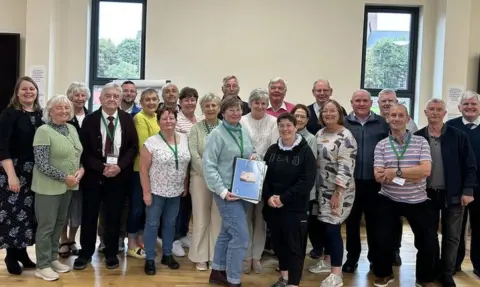 Diocese of Down and Connor
Diocese of Down and ConnorLay ministers still cannot officiate at Masses in the absence of a priest but, in a change to tradition, they will be able to lead the liturgy when a coffin arrives at a church.
After a memorial ceremony, they will also lead prayers at a graveside or crematorium.
Over the past few weeks, the volunteers have received liturgical instruction as well as church training on how to help bereaved people cope with grief.
The Diocese of Down and Connor is the first Catholic authority in Northern Ireland to implement the programme and it could be rolled out on a wider basis.
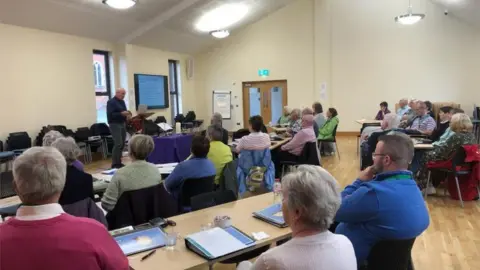 Diocese of Down and Connor
Diocese of Down and ConnorDonal McKeown, who is currently in charge of two dioceses as Bishop of Derry and apostolic administrator of Down and Connor, laid bare his staffing shortages in a pastoral letter in May.
He highlighted the ageing profile of his clergy and warned that in two decades, there might only be about 24 priests available for 86 parishes in Down and Connor.
The diocese currently hosts 3,000 funerals and 800 weddings each year, on top of regular Masses.
Bishop McKeown's letter expressed concern for the welfare of priests who were having to "manage workloads and demands that are unreasonable and not sustainable".
Ageing priests
There are currently 81 priests in full-time ministry in Down and Connor, 13 of whom are aged 70 and over.
The Diocese of Derry has 72 full-time priests, 12 of whom are over 70.
The more rural Diocese of Clogher has a much higher ratio of elderly clergy - more than half its 46 priests are 70 or over.
However, Clogher and many other dioceses still benefit from the support of retired priests who regularly return to the altar to help younger clerics.
Among them is Canon John McKenna, who celebrated his 88th birthday in May but still officiates at Masses every single day.
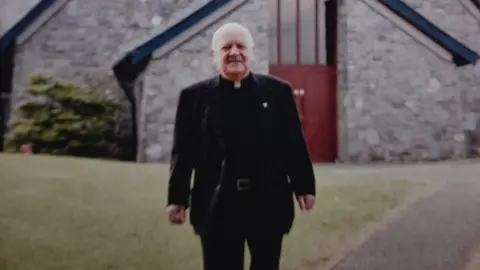 St Patricks Pipe Band, Coa
St Patricks Pipe Band, Coa"I would never miss Mass. I love it," he told BBC News NI.
He was due to step down as parish priest in Trillick, County Tyrone, when he turned 75, but he served an extra six years before nominally "retiring" at the age of 81.
For Canon McKenna, the priesthood is not a normal job but a lifelong commitment and he has no intention of giving up his daily work in the parish.
"It's part of the vocation," he explained, adding he would be "very unhappy" if a time came when he was unable to celebrate Mass.
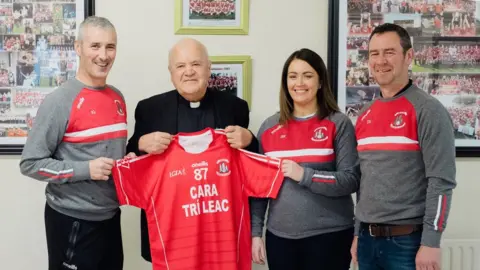 Trillick St Macartans GAC
Trillick St Macartans GACCanon McKenna was born in 1935 into a devout family where Mass and rosary prayers were daily customs.
"My mother was a very religious woman. She trained me well."
When he left school, he entered the seminary at St Kieran's College in Kilkenny and was in his mid-20s when he was ordained.
He was one of 30 men who joined the priesthood in the Republic of Ireland that same day, 4 June 1961.
The Kilkenny seminary closed in 1994.
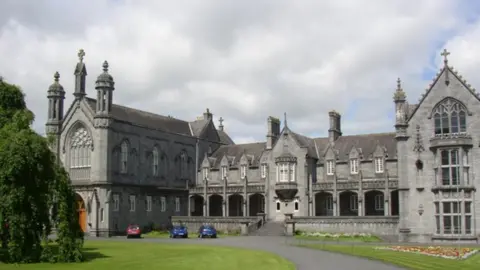 Humphrey Bolton/Geograph
Humphrey Bolton/Geograph"It used to be a great privilege for a family if they had a son who became a priest," Canon McKenna said.
"It's a different culture altogether now," he added, describing the fall in vocations as "very, very sad".
He believes child abuse revelations within the Catholic Church are the "main reason" why so few young people are taking up vocations.
"The scandals in the Church did a terrible amount of damage," he said.
He fears some families may now actively discourage their sons or daughters from taking Holy Orders because of those controversies.
Last week, the Irish Catholic newspaper reported that 15 new seminarians entered formation this year - an early stage of studying for the priesthood.
That figure is slightly up compared to recent years, but is still extremely low in historical terms and nowhere near enough to replace the priests due to retire in the next few years.
All that leaves fewer priests to meet parishioners' needs.
Canon McKenna said greater involvement of the laity in ceremonial duties is not only welcome but "necessary".
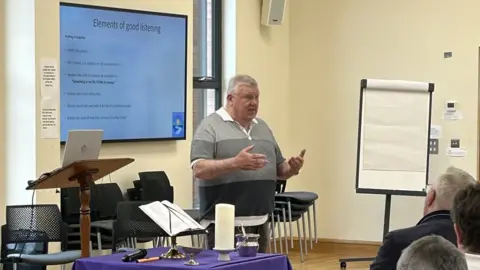 Diocese of Down and Connor
Diocese of Down and ConnorHe explained that some of his colleagues in urban parishes may have two or three funerals a week on top of their everyday duties.
"A lot of preparation goes into a funeral," he said.
"It certainly would take the pressure off priests in the big towns."
His own diocese is collaborating with the Down and Connor pilot and, in November, 44 volunteers from Clogher parishes will begin training as lay funeral ministers.
Although priests may not be available to lead every funeral in the near future, Canon McKenna vowed to help out for as long as he is physically able.
"I have no health issues so far. God has been very good to me."
Neither Dromore nor Armagh provided age profiles for their clergy, but a spokesman for the Armagh Archdiocese said "several priests who are retired are actively engaged in their local parishes".
